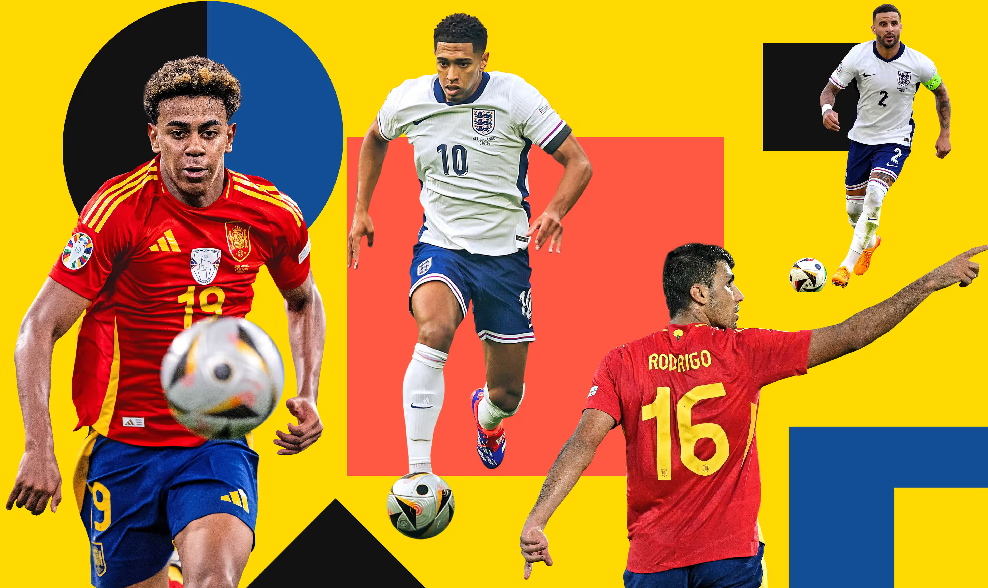Neutering the flanks: left
Spain have been by far the most fluent side at the Euros, by far the best side at the Euros, and much of the reason for that has been their two youthful wingers, Lamine Yamal and Nico Williams. They give Spain a verticality that they have at times lacked since their golden age came to an end at the 2014 World Cup and, beyond that, Lamine Yamal appears to be blessed with that extra quality that elevates the true greats.
His goal against France in the semi-final was stunning. England at least are warned: you cannot afford to stand off him.
But how can England stop them?
The switch to a 3-4-2-1 shape, assuming that is maintained, and its natural skew to the right may help that. Bukayo Saka can drop back when England are out of possession to double up – his defensive work against the Netherlands was superb – but, in possession, he can afford to be bold and make Williams think about him, safe in the knowledge that on the right of England’s back three is Kyle Walker, whose recovery pace is exceptional, and who will be comfortable dropping in to play as a right-back in what is in effect a back four.
Spain have attacked 50% more down their left than the right; Saka against Marc Cucurella, who is not necessarily the best full-back defensively but who gets forward dangerously, will be fighting fire with fire, but that might be the best way to reduce the influence of Williams.

Neutering the flanks: right
On the other side, the danger posed by Lamine Yamal means there is a good argument for retaining Kieran Trippier even if Luke Shaw is fully fit if only because when the winger cuts infield it will be against the defender’s stronger foot – an advantage of a wing-back playing inverted.
That probably means Trippier playing deeper than Saka, but that’s how they’d naturally play anyway. Equally, that cuts against Spain’s skew: the way England have played in this tournament has been barely to attack from wide on the left, with Trippier constantly turning infield, but that means they will not be attacking the area occupied by Dani Carvajal, who is a more effective player defensively than he is going forward.
The Rodri factor
The outstanding player at this tournament, arguably the outstanding player in the world over the past couple of years, has been Rodri, who has a 93.8% pass completion, while making 2.6 successful tackles per game. He is essentially the perfect holding midfielder: he doesn’t give the ball away, and he is a physically imposing ball winner. He also scores the odd goal, as he did against Georgia in this tournament.
It’s no coincidence that he has been on the losing side in only two games in the past 17 months. It may be coincidence that Scott McTominay has been on the winning side in both those games, once for Scotland and once for Manchester United, but it’s worth asking whether there is something in his runs from deep that unsettles Rodri.
Some combination of Kobbie Mainoo, who was also in the United side that overcame Rodri’s Manchester City in the FA Cup final, and Jude Bellingham could perhaps do something similar.
Certainly it would seem worth deploying Bellingham, who quite apart from his ability is a muscular presence, to try to disrupt Rodri. Again it may be that the shape England have happened upon benefits them, with Bellingham and Phil Foden as twin inside-forwards able to attack the spaces either side of Rodri. That, at the very least, may be a way to force Fabián Ruiz, who has had an excellent tournament, to focus more on defending than on adding to the two goals and assists he has registered. Ilkay Gündogan and Emre Can were moderately successful at challenging the Rodri-Fabián Ruiz axis in the quarter-final, forcing Unai Simón to kick long; there is a model there for England to follow.

Space
There is an in-built issue with tournaments for contenders that the style of football they play in the group stage is likely to be very different to that they play at the business end. Or, to put it another way, being able to batter a minnow who sits in a low block has very little to do with the winning of tournaments. And playing against a massed defence is harder for national sides than for elite club sides, who can work day‑to‑day in training to generate the automations that allow the rapid flow of passes that can outflank even the most well-drilled rearguard.
That doesn’t alter the fact that England were inexplicably slow with the ball at times in the group, but it is notable that their best spell of the tournament came in the first 35 minutes against the Netherlands, who were far from compact. Bringing on Joey Veerman when Memphis Depay was forced off was a start in rectifying that, adding an extra midfielder, and in the second half the addition of Wout Weghorst allowed the midfield to drop deeper to plug the gaps, which was why England’s control disappeared.
Spain are adept – still – at holding the ball to kill the game when they have the lead, as they did against France, but they have been relatively open in this tournament; there should be enough space for England, if they can get enough of the ball, to at least attempt to play with the sort of fluidity they did in that half-hour against the Netherlands.








More Stories
Amorim insists Fernandes not leaving Manchester United amid Madrid reports
How debt burden pushed Nigerian boxer Segun Olanrewaju to a fight that took his life
Nigeria Taekwondo Federation boss, Abdullahi Saidu dies at 53